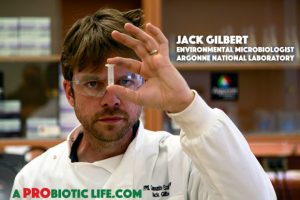- April 21, 2017, 8:00 pm US/Central
- Fermilab Ramsey Auditorium
- Dr. Jack Gilbert
- Tickets: $7
- Purchase tickets »
The human race, like all macrobiological life, evolved in a sea of microbes. There was no way to keep the bacterial and archaeal hordes at bay, so instead life evolved mechanisms to live with these invaders. The immune system was refined over millions of years to control our interaction with the microbial world, and even to use it as a mechanism of defense, food processing, and vitamin production. The immune system and the microbiome have shaped each other in extraordinarily elaborate and intricate ways. Here we will discuss some of the recent evidence highlighting these mechanisms of interaction. We will also discuss how the last 150 years, have started to disturb the delicate balance of the immune-microbe equilibrium. As our natural ecosystem has been restricted to the built environment, especially in the developed world, where an average of 90% of our lives take place indoors, our exposure to the microbial world has been corrupted. Modern buildings are equipped with surfaces and environmental systems designed to reduce the potential for microbial life to flourish. This fundamental shift in our lifestyle is likely impacting the development and function of our immune systems in ways that we are only beginning to understand. We are now starting to experiment with adding bacteria back in to our overly sterile existence, in one such study we were able to significantly reduce cows milk allergy in infants through active manipulation of the gastrointestinal microbiota. Exploring the dynamic interactions that humans share with our indoor space, and mapping the interactions that lead to alterations in our own microbiome will be extremely important for determining the best way to augment our environment with a beneficial microbiome
Professor Jack A Gilbert earned his Ph.D. from Unilever and Nottingham University, UK in 2002, and received his postdoctoral training at Queens University, Canada. He subsequently returned to the UK in 2005 to Plymouth Marine Laboratory at a senior scientist until his move to Argonne National Laboratory and the University of Chicago in 2010. Currently, Professor Gilbert is the Director of the Microbiome Center and a Professor of Surgery at the University of Chicago. He is also Group Leader for Microbial Ecology at Argonne National Laboratory, Research Associate at the Field Museum of Natural History, and Scientific Fellow at the Marine Biological Laboratory.





